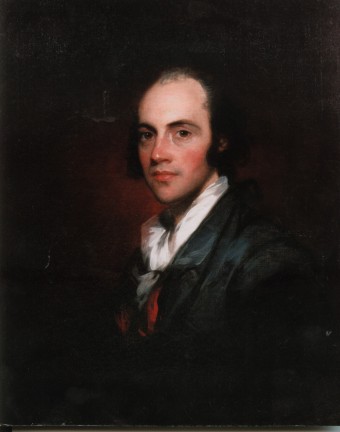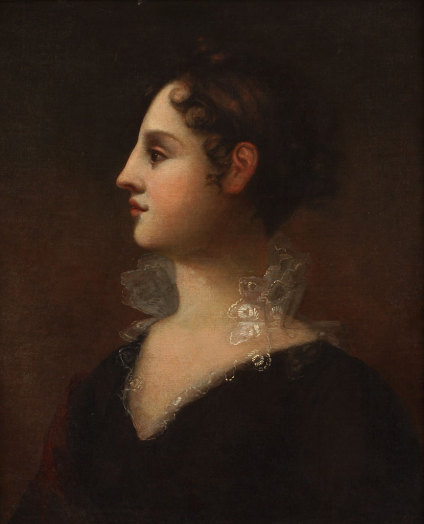(Live in HD at our local theater, thanks to the Metropolitan Opera!, AND a great shout-out to Simon Keenlyside, who did the best Don Giovanni I've ever seen. Wow!)Then the next night, we watched the PBS Documentary on the making of Hamilton, the Musical. Another excellent choice, and I really hope to see the musical itself some day.
HINT: There is a connection between these two...
 |
| Jonathan Edwards, Puritan Divine and Aaron Burr's grandfather |
I can say that, because dueling was common back then: Burr fought other duels besides the one with Hamilton; Hamilton's son died fighting a duel (not with Burr); future President Andrew Jackson fought in 103 duels. So, no, the duel is not the worst thing that Burr ever did.
Aaron Burr (1756-1836) was an interesting man of true New England aristocracy. Not because of wealth, but because of his bloodline. He was the grandson of Jonathan Edwards, the great Puritan Divine who wrote "Sinners in the Hand of an Angry God" (a good read for Halloween, and I should have thought of it earlier). His extreme defense of the most extreme form of Calvinist Predestination terrified people. They trembled, wept, sobbed, and screamed for mercy in the pews, and this turned into The Great Awakening of 1733-35, the first and perhaps greatest revival in American history. Mr. Edwards eventually became the first president of what would become Princeton University; Burr's father, also a Calvinist minister, was the second.
But both of these men were dead by the time he was 2 years old. Burr and his sister Sally were taken in by their 21 year-old maternal uncle Timothy Edwards in 1759. Burr was well educated, and got his BA at 16, and studied theology for 3 years with the noted hard-core Calvinist of his day, Joseph Bellamy. By all accounts, it didn't take. (See below.) He quit and went to study law with his brother-in-law. He got to Connecticut as Lexington and Concord, and Burr joined the Continental Army.
Burr served well: he saved an entire brigade from capture after the British landing on Manhattan - but George Washington did not commend him. Nor would he promote Burr to brigadier general, writing, "By all that I have known and heard, Colonel Burr is a brave and able officer, but the question is whether he has not equal talents at intrigue." Ouch. (No, Washington did not give his reasons.)
After the war, Burr (now married to Theodosia, a widow, by whom he had a daughter, his beloved Theodosia) became a lawyer and went into New York politics. Tammany Hall was already up and running and put him on the Democratic-Republican presidential ticket of 1800 with Thomas Jefferson. The two running mates didn't like each other, but Jefferson needed Burr to get the New York/urban electoral vote. (Electors were chosen by the states' legislatures back then.) But Jefferson neither liked nor trusted Burr to begin with, and it only got worse.
 Jefferson won the popular vote over John Adams, about 41,000 to 26,000 votes.
Jefferson won the popular vote over John Adams, about 41,000 to 26,000 votes. But the electors told a different story. Back then, every elector could vote for two people as long as they didn't come from the same state as the elector (thereby supposedly cutting down on corruption). Whoever got the most votes became president. Now it was understood, in the 1800 election, that Jefferson was to be President, Burr Vice President. But in the Electoral College vote, Jefferson and Burr came out tied, 73 electoral votes each. This threw the election into the House of Representatives, where it deadlocked for 11 days and 35 ballots, as the Federalist party (who hated Jefferson) tried to make Aaron Burr President. Read more HERE.)
And Aaron Burr just sat there. He didn't say, "Oh, but Jefferson was the one running for Presdient,"; he didn't decline the honor; he didn't urge everyone to do what they knew was the right thing to do; he sat there and smiled and waited. This might have been the worst thing that Burr did on the worst day(s), because it was cold-blooded betrayal based on monumental ambition, and BTW, shook everyone's faith in the workings of this newborn democracy.
He lost, but only because Hamilton - no friend AT ALL to Jefferson - told his Federalist friends to support Jefferson because he was "by far not so dangerous a man" as Burr. Better someone with the wrong principles than none at all.
NOTE: Yes, this added to the Hamilton-Burr feud, which went back to their days working for Washington. But part of Hamilton's opposition to Burr was the little matter that Aaron Burr had lied to Hamilton and other Federalists about founding a bank. He said he was going to set up a badly needed water supply company for Manhattan. As soon as he got the backing, he secretly changed the charter to include banking; as soon as it was approved, there was no water company, only a bank. What made this really hurt was that the lousy water led to a malaria epidemic.
NOTE: The 1800 election is what led to the 12th Amendment to the Constitution, which calls for each elector to vote for a President AND a Vice President on their ballot; no more "guess which one wins what spot" politicking.The Burr-Hamilton duel came in 1804, and 1805 was the end of Burr's Vice Presidency. It was a good time to get out of town, and he went to the Ohio River Valley (which was the Western frontier back then), and started acquiring land and raising a private militia. Later, Burr claimed that he was making preparations for war with Spain. When word got back to Jefferson, he ordered Burr arrested, and he was, twice, and acquitted, twice. But then a whole bunch of correspondence came out which showed that Burr was trying to get a lot of money, help Mexico overthrow Spanish power in the Southwest, and set up his own dynasty.
Burr stood trial for treason in 1807, under Chief Justice of the United States John Marshall. He was acquitted because treason requires direct witnesses, and there weren't any. He immediately fled to Europe and lived there until 1812. He spent his time soliciting funding for a conquest of Mexico (didn't get it), and pursuing women. Lots of women. He described his pursuits and encounters in great detail, both in his journals and in his letters home to Theodosia, with dozens of women (now do you understand the Don Juan connection?).
 |
| Theodosia Burr Alston, Aaron Burr's daughter |
BTW, I can understand the journals, but writing his daughter about his sexual prowess seems... inappropriate? to say the least...
NOTE: Harriet Beecher Stowe, who wrote far more about New England life and history than about slavery, made Aaron Burr a major character in her 1859 novel "The Minister's Wooing," portraying him as a Don Juan type, but also as being damaged by an extreme Calvinist upbringing. She also continued the legend that Theodosia - who at 29 was lost at sea in 1813 - was actually "taken by pirates and [died] amid untold horrors" and said that in all of Burr's post-1800 years "one seems to see in a doom so much above that of other men the power of an avenging Nemesis for sins beyond those of ordinary humanity."To be fair, Burr believed women to be intellectually equal to men: he educated Theodosia extremely well, and he submitted a bill to the New York legislature to give women the vote. He also fought to abolish slavery immediately after the Revolutionary War. He was generous financially, often to complete strangers, especially women and children. Still, almost all of his contemporaries, and most historians, have agreed that Aaron Burr was ruled by massive self-interest, and ambition.
| Simon Keenlyside as Don Giovanni, (thanks to the Met); but with the pistol... Aaron Burr? |
Alexander Hamilton: "Mr. Jefferson, though too revolutionary in his notions, is yet a lover of liberty and will be desirous of something like orderly Government – Mr. Burr loves nothing but himself – thinks of nothing but his own aggrandizement – and will be content with nothing short of permanent power [struck: and] in his own hands – No compact, that he should make with any [struck: other] passion in his [struck:own] breast except [struck: his] Ambition, could be relied upon by himself – How then should we be able to rely upon any agreement with him? Mr. Jefferson, I suspect will not dare much Mr. Burr will dare every thing in the sanguine hope of effecting every thing –" Quoted from HERE.
John Quincy Adams: "Burr's life, take it all together, was such as in any country of sound morals his friends would be desirous of burying in quiet oblivion."
Aaron Burr: "The rule of my life is to make business a pleasure, and pleasure my business."